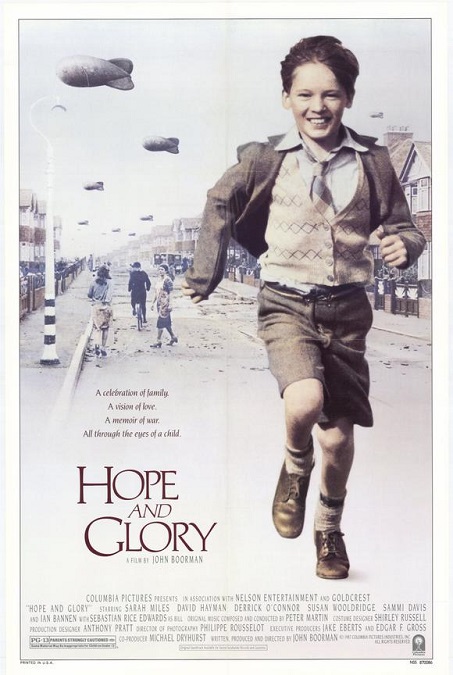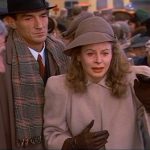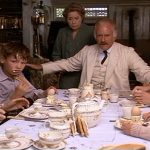
Hope and Glory – 1987
This movie was pretty average. As a drama, it wasn’t overly dramatic. As a comedy, it wasn’t overly funny. And it had such potential to be both. It was actually a coming of age film set against the backdrop of World War II, a subject that is incredibly dramatic and intense, and not at all humorous. But I think the screenwriter dropped the ball. The film looked at the war through the eyes of a child who didn’t really understand it. It white-washed the horrors of the war. Sure, a few bad things happened, but they were few and far between, and seemed to have very little effect on the main character.
Child actor Sebastian Rice-Edwards played Billy Rohan, a young boy living in a suburb of London. He lives with his mother Grace, played by Sarah Miles, his father Clive, played by David Hayman, his older sister Dawn, played by Sammi Davis, and his little sister Sue, played by Geraldine Muir. The family is happy, living their quiet lives, until the war begins. Grace cannot bear to be parted from her children, and does not send them out of the country. But then the air raid sirens begin to blare. Soon after that, the bombs start falling. Clive enlists to fight in the war and leaves.
But here is where the drama of the story fell flat. No bombs destroy their house. Nobody dies. Nobody is even wounded. Clive comes home for Christmas and informs his family that he has been deemed too old for combat duty. He is given the job of a clerk. Dawn starts dating a soldier and gets pregnant. But the father of her child does not die. He goes AWOL and returns to marry her. Grace must deal with caring for her family without her husband, but she manages just fine. Sure, half the neighborhood is a pile of rubble, and a neighbor’s mother is killed, but nothing really bad happens to Billy.
Even when their house is burned down, it isn’t because of an air raid. It is a common fire that might have happened even if there was no war. And even then, they have a safe place to go. They move in with Grace’s cantankerous father George, played by Ian Bannen. He lives in a beautiful house in the country. They no longer have to deal with any of the dangers of the war. Dawn has a safe place to give birth to her child. Everybody is safe and happy, despite going through one of the darkest events in our planet’s history.
How much more dramatic might the film have been if Clive had been killed in action? Or worse yet, what if Grace had been killed in an air raid, and the children, now orphaned, had nowhere to go. What kind of perspective would Billy have had on the war then? The slow pace of the film might have meant something. The drama might have been gripping. Or if they wanted the film to be a comedy, what kind of dark or absurdist humor might have been contrived against the real terrors of war and tragedy?
No, the film was just average, and barely interesting. There was nothing special or unique about the plot. The sets and costumes were appropriate, but again, nothing out of the ordinary. So I have to ask, why was the movie nominated for Best Picture of the year? And that’s the problem. I don’t have an answer. As I mentioned, the pace was slow. The story, which had the potential to be intense, was just bland.
But there was one aspect of the film that was somewhat interesting. Film critic Pauline Kale said it nicely when she wrote, “The war frees the Rohans from the dismal monotony of their pinched white-collar lives… The war has its horrors, but it also destroys much of what the genteel poor like Grace Rohan, have barely been able to acknowledge they wanted destroyed.” In other words, the Rohans weren’t really happy with their lives after all. And from the young Billy’s perspective, the war made a boring existence interesting.
And maybe that was the point of the movie. Maybe it wasn’t trying to be dramatic. It was trying to be quietly profound. Maybe I was just expecting too much drama from a coming of age film that wasn’t really trying to be powerful or dramatic. But then, I still come back to the question. Why was such a quaint and subtle movie nominated for Best Picture? I don’t know.








